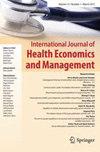Managerial competence of health care managers in hospital obstetric structures
IF 1.5
4区 经济学
Q3 BUSINESS, FINANCE
International Journal of Health Economics and Management
Pub Date : 2021-03-14
DOI:10.14748/HEM.V20I2.7675
引用次数: 0
Abstract
Health care management in hospital obstetric and gynecological structures is carried out by managers who have organizational and communication qualities specific to the health sector, trained to perform managerial and administrative functions. Managers with their knowledge and skills of planning, organizing, directing and controlling financial, human and material resources largely determine the quality of medical care in a medical institution. Solving problems related to defining the duties, activities, rights and responsibilities of primary and senior midwives is an important condition for improving and developing the quality of medical care. It is important for practice to manage time, activity, motivation, and development by changing not only the work model, but also the approaches, activities, and thinking style of health managers at different hierarchical levels. This means a new development of flexible management competence. Management is inextricably linked to efficiency. It requires constant monitoring of the ratio of „benefits“ of results“ of each activity in different structures and hospitals, as a macronutrient. An effective manager is not just a good employee who is preferred by his subordinates. This is a person who is able to increase the usefulness of medical services with relatively limited resources. the new approach, new style and new way of thinking require managers at different levels of management in hospitals not only to understand hospital management, but also to have the qualities for successful leadership. The purpose of this work is to study the possibility of applying a methodological model of obstetric health care management and its importance for improving their quality and effectiveness. The object of the study is the management of obstetric and gynecological health care in 16 hospitals. The study is based on the use of a direct individual survey and covers 68 primary and senior midwives. Signs related to the organization of work in the ward, the role and place of the midwife in the treatment process were studied. the analysis of the survey data was aimed at characterizing obstetric care in a hospital setting and the applicability of a single health management model with the corresponding information product to the hospital information system.医院产科机构卫生保健管理人员的管理能力
医院产科和妇科机构的保健管理由具有卫生部门特有的组织和沟通素质的管理人员进行,这些管理人员接受过管理和行政职能方面的培训。管理人员在计划、组织、指导和控制财务、人力和物质资源方面的知识和技能在很大程度上决定了医疗机构的医疗质量。解决与确定初级和高级助产士的职责、活动、权利和责任有关的问题,是改善和发展医疗保健质量的重要条件。通过改变工作模式,以及不同层次卫生管理人员的方法、活动和思维方式来管理时间、活动、动机和发展,对于实践来说是很重要的。这意味着柔性管理能力的新发展。管理与效率密不可分。它要求作为一种宏量营养素,不断监测不同结构和医院中每项活动的"效益"与"结果"的比率。一个有效的管理者不仅仅是一个受下属青睐的好员工。这是一个能够以相对有限的资源增加医疗服务效用的人。新思路、新作风、新思维要求医院各级管理人员不仅要懂得医院管理,而且要具备成功领导的素质。这项工作的目的是研究应用产科保健管理方法模型的可能性及其对提高其质量和效力的重要性。研究的对象是16家医院的产科和妇科保健管理。这项研究基于直接的个人调查,涵盖了68名初级和高级助产士。研究了与病房工作组织有关的标志,助产士在治疗过程中的作用和地位。对调查数据的分析旨在描述医院产科护理的特点,以及单一健康管理模式和相应信息产品对医院信息系统的适用性。
本文章由计算机程序翻译,如有差异,请以英文原文为准。
求助全文
约1分钟内获得全文
求助全文
来源期刊
CiteScore
3.60
自引率
0.00%
发文量
18
期刊介绍:
The focus of the International Journal of Health Economics and Management is on health care systems and on the behavior of consumers, patients, and providers of such services. The links among management, public policy, payment, and performance are core topics of the relaunched journal. The demand for health care and its cost remain central concerns. Even as medical innovation allows providers to improve the lives of their patients, questions remain about how to efficiently deliver health care services, how to pay for it, and who should pay for it. These are central questions facing innovators, providers, and payers in the public and private sectors. One key to answering these questions is to understand how people choose among alternative arrangements, either in markets or through the political process. The choices made by healthcare managers concerning the organization and production of that care are also crucial. There is an important connection between the management of a health care system and its economic performance. The primary audience for this journal will be health economists and researchers in health management, along with the larger group of health services researchers. In addition, research and policy analysis reported in the journal should be of interest to health care providers, managers and policymakers, who need to know about the pressures facing insurers and governments, with consequences for regulation and mandates. The editors of the journal encourage submissions that analyze the behavior and interaction of the actors in health care, viz. consumers, providers, insurers, and governments. Preference will be given to contributions that combine theoretical with empirical work, evaluate conflicting findings, present new information, or compare experiences between countries and jurisdictions. In addition to conventional research articles, the journal will include specific subsections for shorter concise research findings and cont ributions to management and policy that provide important descriptive data or arguments about what policies follow from research findings. The composition of the editorial board is designed to cover the range of interest among economics and management researchers.Officially cited as: Int J Health Econ ManagFrom 2001 to 2014 the journal was published as International Journal of Health Care Finance and Economics. (Articles published in Vol. 1-14 officially cited as: Int J Health Care Finance Econ)

 求助内容:
求助内容: 应助结果提醒方式:
应助结果提醒方式:


